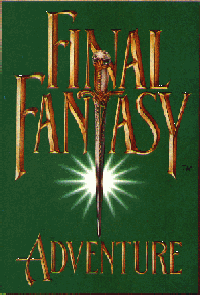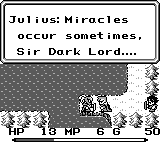|
|

|
PLATFORM
|
Gameboy
|
BATTLE SYSTEM
|

|
INTERACTION
|

|
ORIGINALITY
|

|
STORY
|

|
MUSIC & SOUND
|

|
VISUALS
|

|
CHALLENGE
|
Easy
|
COMPLETION TIME
|
Less than 20 Hours
|
|
OVERALL

|
+ Simple but fun battle system.
+ Solid sountrack.
+ Decent visuals.
- Inventory fills up quickly.
- Some points of no return.
- Story is somewhat thin.
|
Click here for scoring definitions
|
|
|
A young gladiator is forced to fight for Dark Lord's personal entertainment, yet one day escapes, overhearing him conspire with a mysterious wizard named Julius to seize the power of Mana and control the world. After his escape (and a very nasty plunge down a waterfall), the hero saves a mysterious young girl from monsters and travels to world to stop the ambitions of Dark Lord and Julius. Square's Final Fantasy Adventure for the Gameboy was the very first installment of their Seiken Densetsu (Mana) series, originally released in Japan as a spinoff of the Final Fantasy franchise, and provides a simple but enjoyable romp in spite of its flaws.
FFA is an action RPG, so naturally, combat is real-time, with the protagonist able to attack enemies wandering the overworld and dungeons with a variety of weapons, use MP-consuming magic, or use items. Weapons include the sword, the spear, the axe, and so forth, with a few sometimes necessary to advance through the game; for instance, the axe can cut trees blocking the hero's path, and the sickle can cut thick grass. Enemies themselves are invulnerable to certain weapons, with weapon swapping adding a minor element of strategy, and weapons having different ranges and areas of effect. The hero also occasionally gains an immortal A.I.-controlled ally whom he can "Ask" for certain effects such as HP recovery.
Another element is the hero's power gauge, which, when full, lets him perform a powerful move with his current weapon, and fills up faster as he levels. When the hero does level by experience gained from enemies (alongside money) the player can pick one of four stats to increase. Bosses also occasionally block the player's advancement of the game, yet typically don't require a great deal of strategy other than hacking away at them and backing off to heal, and typically don't take a long time (even the last boss). Status ailments, which usually wear off after a wear seconds, aren't terribly intrusive, either. Regardless of its simplicity, and the game's consequential ease, the battle system is surprisingly fun, and good stress-relief, at that, with the only real flaw being the ability of foes to move diagonally, whereas the hero is restricted to four directions.
Inventory management, though, can be annoying since many foes tend to drop treasure chests with items in them, and thus, items pace can fill up quickly, with items not stacking up (although some come in meager "sets"). The player can't check the contents of said treasure chests beforehand with a maxed inventory, either, and thus have to constantly make room for newer treasure. Some points of no return are another issue, as well, especially if the player forgets to buy a few sets of keys often necessary to advance through dungeons, and thus, it could potentially become impossible to actually complete the game. Luckily, though, the player can save the game anywhere, although keeping multiple save files in case of said points of no return might be a good idea. There are some other flaws, too, such as the sometimes-convoluted dungeon design (with no in-game maps available for these), an utterly unhelpful overworld map, and lousy direction on how to advance at times, and overall, interaction could have been far better.
 Like the fact that the original version of this game is *better* than the remake
Like the fact that the original version of this game is *better* than the remake
|
|
Being the first installment of a series, Final Fantasy Adventure was in many ways creative, given the variety of weapons the player can use to slaughter enemies and by extent the story, focusing on the Tree of Mana, which would influence its successors, though originally being a spinoff of the Final Fantasy franchise, it does naturally borrow a little from that series, with elements such as a chocobo, the moogle status ailment, and some borrowed character sprites, but otherwise, it was still sufficiently inventive.
The story suffers from the typical brevity just about all RPGs of the era did, what with limited scenes, weak pacing (not helped by the aforementioned lack of direction at times), and a weak translation, as well, with unnatural dialogue that sometimes has a pidgin feel. Even so, however, the plot was one of the better ones of the era, with some minor semblance of character development, decent backstory, and occasional sad moments. Still, the story would have certainly benefited from better direction and development.
The music, composed primarily by Kenji Ito (with Nobuo Uematsu contributing his ever-famous chocobo theme), is the game's strongest aspect, with many catchy tunes that fit the game's various scenes, moods and environs, with a decent variety of sound effects, as well, for instance, with different weapons having different sounds. All in all, an excellent-sounding game.
Always difficult it is, though, to judge the quality of monochrome Gameboy graphics, although the character and enemy sprites still have sufficient detail, with palette swaps for the latter pretty much being impossible because of the limited colors, and scenery having sufficient variety as well, with little difficulty in knowing what kinds of terrain the player is visiting. Overall, the visuals are more than sufficient for a Gameboy game, even if simplistic at times.
Finally, the first Seiken Densetsu is fairly short, taking a little less than ten hours to complete, with little, aside from potentially getting lost for a while, to boost playing time. Overall, Final Fantasy Adventure was a solid title for its time, one of the strongest action RPGs to appear on the original Gameboy, with plenty of things going for it such as simple but enjoyable combat, a solid soundtrack, and decent visuals. Many aspects such as the interface and story could have easily been better, although the game still holds up nicely even today, even being superior to its Gameboy Advance remake, Sword of Mana, as well as more contemporary Mana titles, which have sadly attempted to reinvent the series for the worse, making one wonder if the series will ever return to its noble, more playable roots.
Review Archives
|









